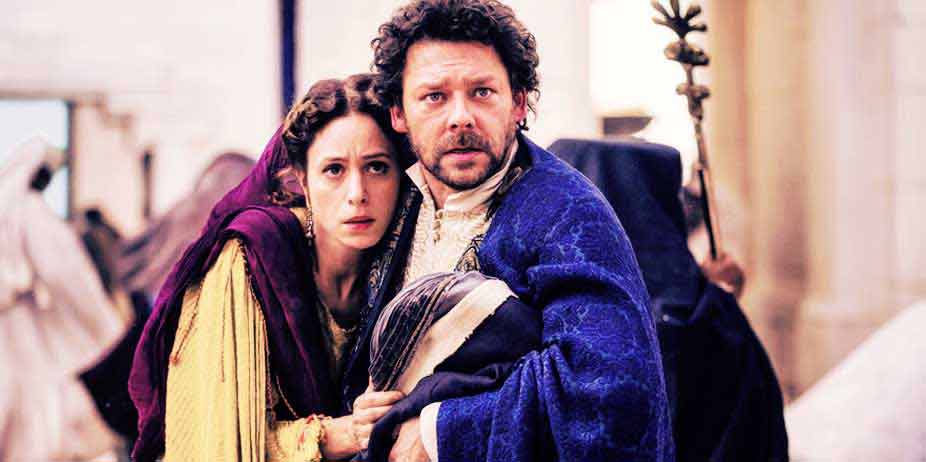
A.D. The Bible Continues / A.D. Kingdom and Empire (2015)
A sprawling epic that takes place
in the aftermath of the Messiah’s crucifixion, A.D.
centers on pivotal characters, Biblical, Historical,
and Fictional. One of the largest and certainly the most
impressive and high-quality productions aimed at
religious audiences, it features a host of memorable
characters, significant events, and stirring moments.
Crucify him!
The crowd takes up the shout under
the subtle guidance of the High Priest, Caiaphas
(Richard Coyle). Together with his wife, Leah (Johdi
May), and with the encouragement of others among the
Sanhedrin, he has conspired to bring the Messiah (Juan
Pablo Di Pace) before Pilate, hoping for a death
sentence. Though Pilate (Vincent Regan) finds no fault
in this man, and his wife (Joanne Whalley) warns Pilate
he will regret it, he agrees to the execution. Terrified
that the officials will arrest and kill them as well,
Jesus’ disciples scatter... and it devastates Peter
(Adam Levy) to fulfill Jesus’ prophecy by denying Him
three times.
Only John (Babou Ceesay) has the
courage to accompany Mary Magdalene (Chipo Chung) and
Jesus’ mother (Greta Sacci) to the crucifixion, and
tearfully shares the event later with the disciples who
creep into the upper room under the cover of darkness.
Though dead, the Messiah overshadows all their lives
that day, and for several days following... as Caiaphas
violently reacts to his burial in a tomb, as Mary
believes He will rise again, as the disciples attempt to
discern whether they should remain in Jerusalem or flee
while the coast is clear.
One earthquake, an angelic
presence, and a stone rolled away later, and all their
lives change... forever.
Assassination attempts,
insurrectionist groups, and political intrigue play out
alongside the beginnings of the ancient church.
Scripture, historical documents, and speculation fill in
the gaps in the Biblical narrative and to flesh out the
characters from the different cultural groups involved.
This is not a straight up Biblical retelling, but a
fictionalized account of events in Jerusalem, featuring
a large cast of diverse figures with different motives.
The two most notable ones are Peter, a father and sudden
leader grappling with his newfound power, and Caiaphas,
a hardened politician who writes off his cruelties as
necessary to protect the Jewish race. This Pilate is
even darker than the historical figure, bordering on the
verge of insanity, while his wife attempts to pull
strings behind his back to undermine his brutal tactics.
Some viewers may not like the
addition of fictional characters (notably, the Zealots)
but it broadens the story to include the time’s
religious and political upheaval. The episodes follow a
similar formula in half is a fictionalized event and
character driven, while the remaining events are all
scripturally inspired. The history is iffy (Pilate did
not crucify ten Jews a day until he found a zealot
assassin; that was drawn from the fall of Jerusalem and
the subsequent brutality in 69 A.D., nor is it likely
half the disciples would be of African descent), but in
all ways, this is a high-quality production. Watching it
week to week it had an incredible effect on my spiritual
life. It moved me in ways nothing has moved me in
before. It pulls no punches in addressing a lot of
intense themes, including the power of forgiveness (if
you do not forgive, are you truly a follower of
Christ?). The miracles and instances of healing are
goose bump-inducing. Tabitha’s resurrection by the Holy
Spirit brought me to tears. Each episode contrasts a
lesson or belief in the followers of Jesus’ lives,
contrasted with the brutality of the external world.
It has gorgeous costuming and set
design, intense, well-written scripts, and mysterious,
nuanced characters. I adore its depiction of Paul. The
score is magnificent. Though it goes overboard in its
violence, even after a dozen viewings, it still keeps me
on the edge of my seat and has inspired me to re-read
the book of Acts.
Sexual Content:
Caligula and Agrippa make passes at slave girls (non-graphic
groping, mild innuendo, pressing them against walls); they
are shown asleep in a room with two half-undressed
prostitutes. Mention of "whores" is made. Caligula
rapes a servant (off-screen; we hear him mention how
unwilling she was and laugh about it; she later cries on another
woman's shoulder). Claudia infers that Caligula might summon
her to Rome for his own pleasure.
Language:
None.
Violence:
Brutal and frequent. Jesus is flogged (briefly) and
crucified (more graphic). The disciples are beaten and
flogged. Men are beaten brutally and then strangled; Pilate
stabs a man in the chest and twists in the knife; he orders
him to be tortured and we see him burned with an iron before
an arrow pierces his heart. Stephen is stoned to death (we
see and hear many rocks strike his head, until it kills
him). Saul has Christians tortured for information (we see
them bruised and bloody); a man is smothered in his sleep. A
woman is flogged (we see one lash strike, the rest happens
off-screen); another is strangled (implied, seen out of
focus in the background). A woman slaps a man; he then
strikes her so that she falls to the floor and throttles her
(to make a point; he soon stops).
Other:
Scripture is altered in some instances to accommodate a
condensing of time and/or add theatrical elements.
